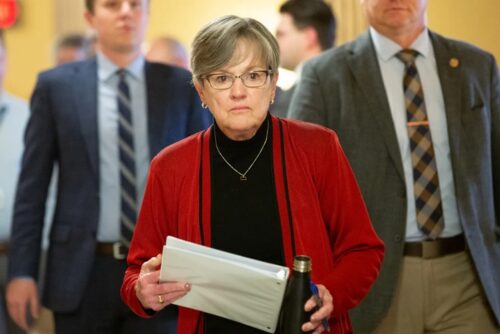
4.16.25 – Topeka Capital-Journal – Jack Harvel
Kansas lawmakers passed 116 new laws this legislative session, making it the second-most productive Legislature in the past two decades.
Key Points
- Kansas lawmakers passed 116 new laws this session, the second most in the past two decades.
- Gov. Laura Kelly signed 95 bills into law and allowed eight to become law without her signature.
- The Legislature overrode 14 of Kelly’s 18 vetoes, the most overrides during her time as governor.
- Four vetoes were sustained, none of which reached a two-thirds majority in the House.
Kansas lawmakers passed 116 new laws this legislative session, making it the second-most productive Legislature in the past two decades.
The feat was achieved despite the relatively short legislative session and despite Kansas Gov. Laura Kelly vetoing 18 bills, the second-highest total in her tenure as governor.
“This has been a short session, and there has been a lot of comments about a short session in the press and in the public,” said Kansas Sen. Chase Blasi, R-Wichita, said on the Senate Floor on April 11, “but despite this being a shorter session, this is one of the most productive sessions in our state’s history.”
Blasi said the only legislative session to surpass this year’s in total bills passed was 2021, when lawmakers worked on several bills that stalled due to COVID the prior year.

Governor signs most bills
Kelly signed 95 bills into law this session, which is more than 80% of the bills that passed the House and Senate. Although some bills faced political battles, many passed both chambers with bipartisan support to become law.
Eight bills became law without signature
Kelly allowed eight bills to become law without her signature, usually to signal that she believes the legislation is flawed. Her messages on bills that she neither signs nor vetoes generally indicate she’s supportive of or sympathetic to the bill’s aim but has issues with the process it proposes to solve it.
Legislature overrides 14 vetoes
To override a veto, at least two-thirds of both the House and Senate must vote to create the law despite a veto. It requires 84 of 125 representatives and 27 of 40 senators vote to overturn a veto.
Expanded supermajorities in the House and Senate allowed lawmakers to overturn 14 vetoes, more overrides than any other session during Kelly’s tenure.
- In 2024, lawmakers overrode seven vetoes.
- In 2023, lawmakers overrode eight vetoes.
- In 2022, lawmakers overrode four vetoes.
- In 2021, lawmakers overrode five vetoes.
- In 2020, all four of Kelly’s vetoes were sustained.
- In 2019, all three of Kelly’s vetoes were sustained.
Four vetoes sustained
Only four of the governor’s vetoes were sustained this year. More of Kelly’s vetoes were sustained every year of her governorship outside of 2019, when she only vetoed three bills, and 2020, when she only vetoed four bills.
Get the Afternoon Headlines newsletter in your inbox.
Get the latest headlines you may have missed
Delivery: WeekdaysYour Email
Of the four vetoes sustained, the Senate had apparent two-thirds majority to override a veto, but the House came up short.
- Senate Bill 18 would have created a distinct license plate for Hunter Nation. A similar bill passed after complaints that Senate Bill 18 would have benefitted a 501(c)(4), which are often used for lobbying. The bill that passed benefits a 501(c)(3) branch of Hunter Nation.
- Senate Bill 79 would have directed the Kansas secretary for children and families to request that federally funded food stamps not allow the purchase of certain candy and soft drinks. The Senate voted to override the veto, but the House didn’t take it up. The House was about 20 votes shy of a veto-proof majority.
- House Bill 2028 would have revived a law offering a discount for hunting and fishing licenses for people over the age of 65, reduced the fee for lifetime hunting and fishing licenses for children and barred non-residents from hunting migratory waterfowl between Wednesday and Saturday during hunting season. It passed unanimously in the Senate but was 19 votes short of a two-thirds majority in the House.
- House Bill 2228 would have required political subdivisions like a city or county to hold an open meeting about contingency-fee-based legal services, where lawyers are only paid if they achieve a desired outcome, and have its contract approved the the Kansas attorney general. It passed with a veto-proof majority in the Senate, but was 11 votes short in the House.
How number of vetoes compares to past years
Kelly didn’t break her veto record of 21 bills, which she broke last year, but it’s the second-highest number of vetoes since she became governor.
- In 2025, Kelly vetoed 18 bills.
- In 2024, Kelly vetoed 21 bills
- In 2023, Kelly vetoed 17 bills.
- In 2022, Kelly vetoed 11 bills.
- In 2021, Kelly vetoed 10 bills.
- In 2020, Kelly vetoed four bills.
- In 2019, Kelly vetoed three bills.
